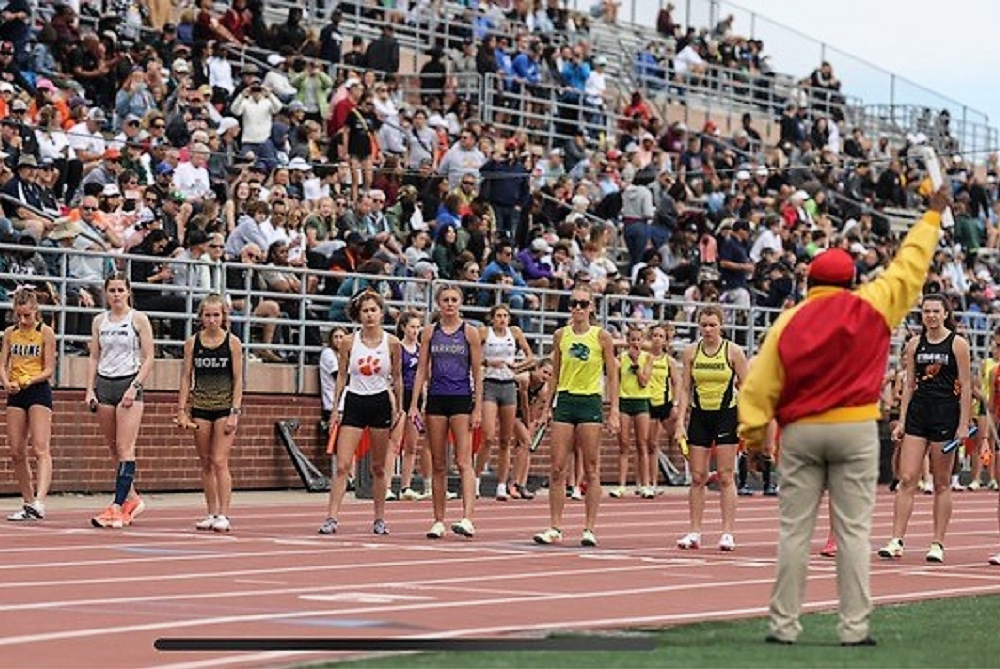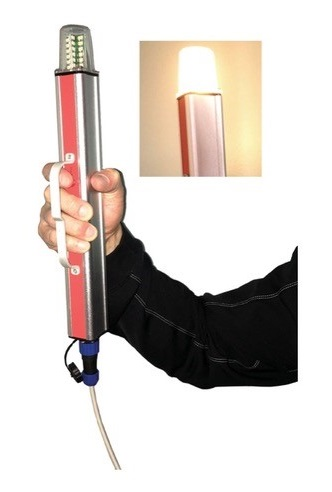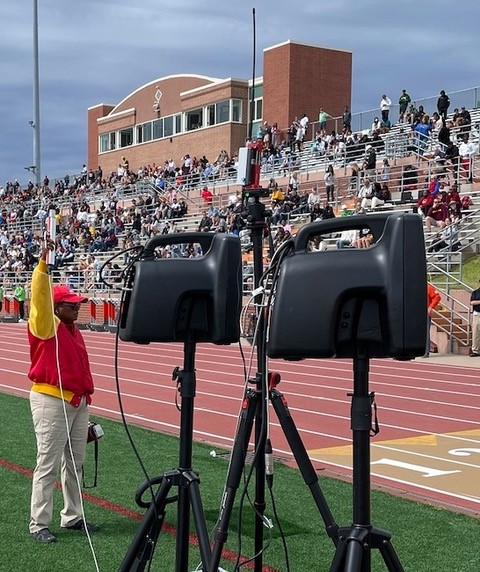
Track Gaining Speed Toward Future with Electronic Starting Devices
By
Steve Vedder
Special for MHSAA.com
May 23, 2023
Aubrey Greenfield thinks it might be the perfect time to reevaluate 130 years of tradition.
For a number of reasons, from technical to personal, the Oxford senior sprinter believes it makes sense for the crack of a starting pistol to be eliminated from high school track meets.
Because track meets would benefit in various ways from lowering costs to easier setup at meets to the human factor of competitors not having to flinch at the crack of a pistol shot, Greenfield believes the sport has a chance to embrace new technology – electronic starting devices (ESD).
In essence, an ESD replaces the starting pistol with a light flash, tone sound or both to begin a race.
"High school sports should put the athlete first," Greenfield said. "We should promote sports, and eliminating starting pistols promotes health in terms of PTSD or trauma for athletes and spectators and that would be good. I would like to think people would say that's a good idea."
In fact, Greenfield would go as far as to say if there was not an implementation of electronic starting devices, many of her teammates would have considered giving up the sport.
"If it's something that helps us compete safely, we're all for it," she said.
Greenfield's opinion apparently is spreading. Michigan High School Athletic Association senior assistant director Cody Inglis said the use of ESD makes it both affordable for meet starters and sensible for athletes and fans to rethink the use of starting pistols. While the MHSAA is not mandating electronic starting devices, it does promote the use of what Inglis calls "emerging technology." He notes that ESD are becoming the norm for organizations such as USA Track & Field, the NCAA and an increasing number of high schools.
 "I think we have to embrace new technology, and we think this will be something that takes hold," Inglis said.
"I think we have to embrace new technology, and we think this will be something that takes hold," Inglis said.
A key part of embracing ESD is the human element. The tragic Oxford High School shooting Nov. 30, 2021, that took the lives of four students while injuring seven others should not be relived even for a fleeting instance at a high school sporting event. Oxford athletic director Tony DeMare said the school began using ESD at every meet, including the MHSAA Lower Peninsula Division 1 Finals last June. He said that decision was embraced by virtually all schools Oxford encountered.
"We were very convinced that the alternative (of ESD) would promote a healthy attitude," DeMare said. "We were overwhelmed with the positive response. If a school was on the fence about it or might not be for it, I think we've started to see the tide turn in favor of people willing to listen and learn about electronic starting devices."
Inglis said the MHSAA is acutely aware of what the crack of a starting pistol can mean to athletes and fans.
"It's unimaginable what Oxford went through, and this is a small way we can help," he said. "We look at a (starting pistol) and think, ‘Could we do something else?’ It's a way of helping to solve a problem."
Over the last several years, the MHSAA has embraced finding an alternative to starting pistols. Inglis noted the discussion started with the cost and diminishing availability of 32-caliber ammunition that meet starters use. A box of ammunition, if it can be found, is around $75 a box.
In addition to cost, there is potential damage from excessive exposure to 150-plus decibels of sound generated by the traditional 32-caliber blanks. Medical studies show damage to ears caused by decibel levels above 120 dB.
The tragedy at Oxford accelerated the conversation.
Inglis said the cost of ESD can be likened to a school sinking money into artificial surfaces at football fields. Yes, there is a great cost at first, but over time money is ultimately saved. An ESD system itself ranges between $200 and $500. Speakers also may need to be purchased, but with ESD starting events like the 800 and 1,600-meter relays positioned near the outside lanes 8, 7, 6 and 5 would result in improved hearing by athletes at the start of a race.
There is one challenge with ESD that track administrators are working to overcome – lighting conditions that lessen the ability to see the ESD’s LED light or strobe when the button is pressed by a starter to begin a race. But that vision difficulty resulting from clear blue skies and backgrounds of setting suns can be substantially improved by incorporating a black background with an ESD – something as simple as a starter holding up black cardboard behind the lighting mechanism at the start of an event.
Inglis said when all factors are considered, the use of ESD makes sense.
 "With the climate we live in nowadays, no lookalike guns is good," he said. "We're not mandating this. But people are saying this is affordable."
"With the climate we live in nowadays, no lookalike guns is good," he said. "We're not mandating this. But people are saying this is affordable."
While switching to ESD would break 130 years of tradition, the timing could be a step forward, said Jeff Hollobaugh, co-author of the book "The Fleet Feet of Spring: Michigan's High School State Championships in Track & Field." He said while no definitive answer is possible, it's likely starting pistols were used at the inaugural state meet at the Jackson Fairgounds in 1895. The meet, which included events like tossing a 16-pound shot put, bike races and a 100-meter sprint, was sponsored by the Michigan Interscholastic Athletic Association (a predecessor to the MHSAA) and comprised mostly of the state's larger schools.
Hollobaugh's sentiments echo what many involved in today's high school track & field believe in terms of making a transition from starting pistols to electronic starting devices.
"It's a change, not necessarily good or bad, just different," he said. "It's not a drastic change, but it will take some getting used to. But it is the future. In the end, we'll all be fine."
DeMare believes the future of high school track will definitely include ESD.
"Our desire is that the practicality and sensibility of this will overcome the alternative," he said. "I think we'll see the automation and electronics taking hold of certain elements in track, and people will embrace it."
PHOTOS (Top) Runners watch official Bertha Smiley as they prepare to begin a race during last season's Lower Peninsula Division 1 Finals at Rockford. (Middle) An electronic starting device provided by VS Athletics was used to start those races. (Below) Smiley sets to begin an event. (Photos provided by David Kuderka/VS Athletics.)

High 5s - 4/24/12
April 24, 2012
Each week, Second Half gives "High 5s" to multiple athletes and a team that have performed exceptionally on the field or made a notable impact off of it.
Please offer your suggestions by e-mail to editor Geoff Kimmerly at [email protected]. Below are this week's honorees:
 Mallory Weber
Mallory Weber
Northville senior
Soccer
Weber, a two-time Division 1 all-state forward, leads one of the best teams in the state. Northville is 5-0-2 and ranked No. 3, with its most significant win so far coming last week, 1-0 over reigning Division 1 champion and current No. 5 Novi. Although Weber did not score that goal, she did help open up the field by drawing two and at times three defenders. She has nine goals and five assists this season, and has signed with reigning Big Ten regular-season champion Penn State after also considering the University of Maryland and the University of Miami (Fla.). She also played basketball at Northville.
For love of the game: "I love soccer. It's so competitive. It's just fun. It's fast-moving; basketball you stop so much, but in soccer you're always continuing."
I learned the most about soccer from: "Probably my (club) coach Andy Vanover. He was my coach for probably six years, and he taught me to never give up. That work ethic is part of what makes my game so hard to defend."
I model my game after: FC Barcelona star Lionel Messi. "Just how he's so good with his foot skills. That's the biggest part of my game I try to work on."
Up next: Weber is undecided on her major at Penn State, but is considering something in food science and nutrition. "I just like the whole thing of how food affects your body, how it plays into your performance."
 Jake McFadden
Jake McFadden
Clare senior
Track and Field
McFadden won the 110-meter hurdles (14.9 seconds), the 300 hurdles (39.3) and the 200 dash (22.3) on Saturday at the Remus Chippewa Hills Invitational as Clare scored 174 points to finish first. He's the reigning MHSAA Division 3 champion in both hurdles races and helped Clare to a third-place team finish at the 2011 Final. He also owns school and Jack Pine Conference records in the 110 (14.82) and 300 (39.28), according to a report by the Mount Pleasant Morning Sun. McFadden played football in previous falls until this school year, when he switched to cross country to help him get into better shape for track season.
Up next: McFadden has signed to run track at Michigan State University, and will study biomedical engineering. "I just like the working-with-my-hands aspect, making new things (like) replacements for hips and knees, making innovations in that kind of stuff."
Quick learner: McFadden shot put and ran on a relay in junior high, but didn't try hurdling until high school. "I just watched a lot of film on myself, just fixed stuff there."
I look up to: "I'd say my brother (Mike McFadden, a 2010 Clare grad). He's the one who really got me into track. He played baseball freshman year and ran track sophomore year, and he really liked track. I wanted to follow in his footsteps and see what I could do."
Crossing over: "I played football every year but senior year. I ran cross country this year. It was a good experience, got me in shape. I ran about what I wanted to run, time-wise."
 Stevensville Lakeshore softball
Stevensville Lakeshore softball
In a battle of top-ranked teams, Stevensville Lakeshore -- ranked No. 1 in Division 2 -- downed Division 1 No. 1 Mattawan 4-3 in eight innings to win Saturday's Mattawan Invitational. The Southwestern Michigan Athletic Conference rivals also met in last season's Mattawan championship game, with Mattawan winning in eight innings, and again in last weekend's Portage Invitational final -- a 4-2 Wildcats win. Mattawan had won 38 straight games before falling to Portage Central earlier Saturday.
Lakeshore also beat Division 1 No. 3 Grandville, 7-1, and Vicksburg 6-1. The Lancers improved to 11-2 with the tournament sweep.
This spring's previous honorees
Sarah Appold, Saginaw Valley Lutheran softball
Nick Stiles, Bath baseball

